Sunday Feb 22, 2026
Sunday Feb 22, 2026
Thursday, 15 May 2025 00:28 - - {{hitsCtrl.values.hits}}
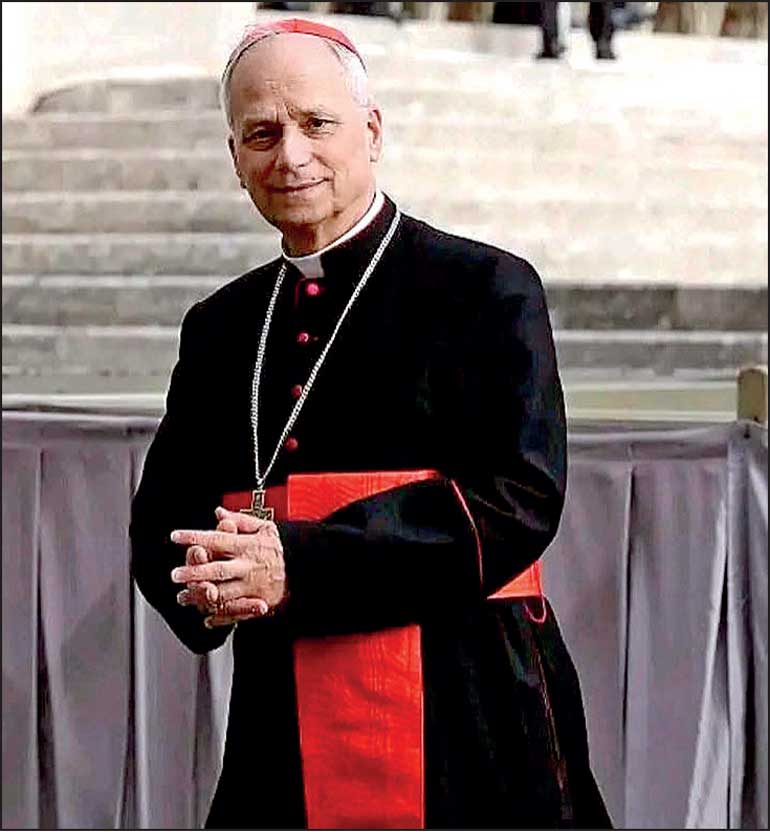
Cardinal Robert Prevost, now Pope Leo XIV
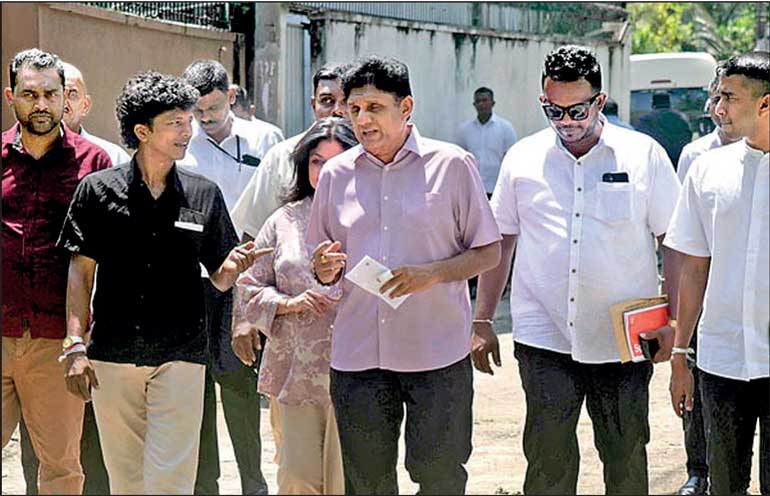
Widespread, stable, slow-growing Opposition
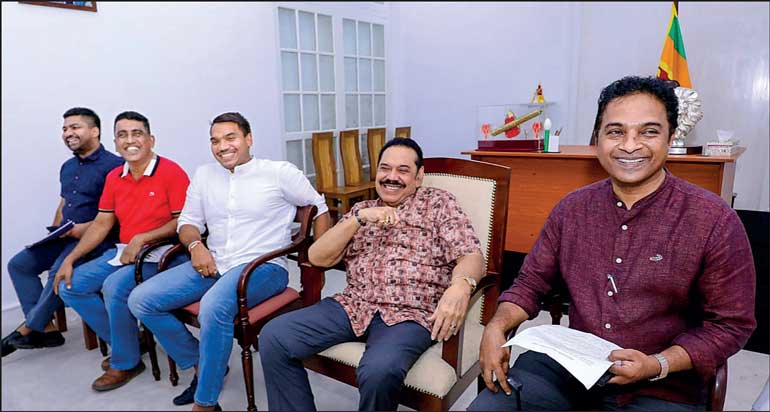
Grows vote by 300%
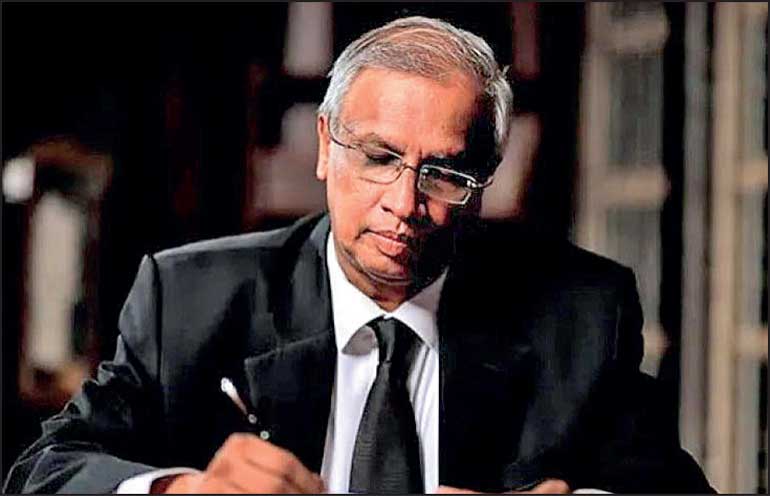
ITAK’s Sumanthiran: Exemplary comeback
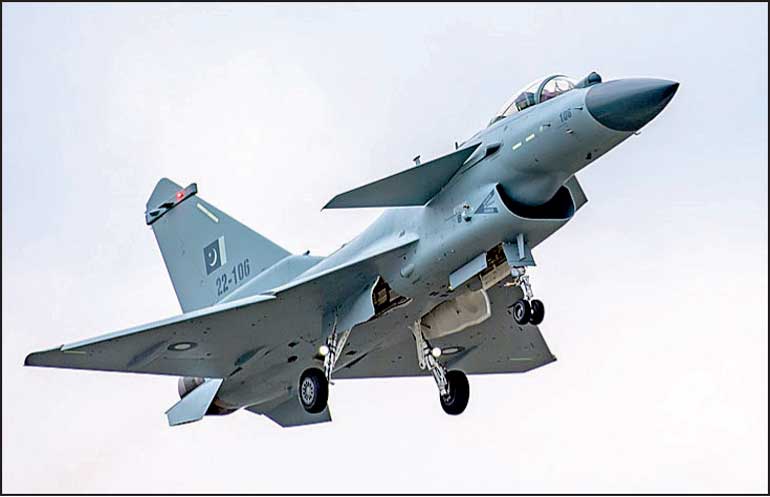
Pakistan’s Chinese-built J10C fighter scores
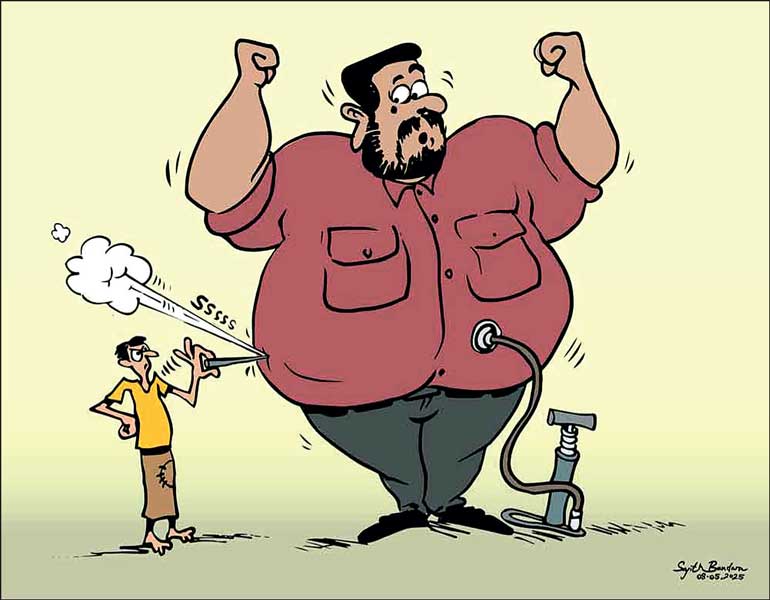
LG election
“This is not the end. It is not even the beginning of the end. But it is, perhaps, the end of the beginning.”
– Winston Churchill 1942 –
 We South Asians need to thank Great Power rivals USA and China. The USA has stopped the dangerously escalating Indo-Pak war. China manufactured the weapons that helped Pakistan create the stalemate that gave time and space for the American initiative.
We South Asians need to thank Great Power rivals USA and China. The USA has stopped the dangerously escalating Indo-Pak war. China manufactured the weapons that helped Pakistan create the stalemate that gave time and space for the American initiative.
But the toughest issue remains: India’s dangerous regional and global precedent of weaponising the waters of the Indus river which were shared with Pakistan since 1960 under an international agreement which includes the World Bank.
The world has many nuclear powers with far larger stockpiles than India-Pakistan, but nowhere are they face-to-face adversaries who have fought several hot wars. The systems of existing nuclear powers are more established, older, and more stable. However, India and Pakistan have nuclear weapons stockpiles atop volatile polities. Nowhere else is the nuclear standoff between two states resting on volatile dominant ideologies fuelled by religion. The nuclear threshold is far less inelastic than it is anywhere else.
Those of us in the neighbourhood are more vulnerable than countries in any other part of the planet. Ceylon/Sri Lanka was never as silent and passive about an Indo-Pakistan clash as it has been under the administration of President Anura Kumara Dissanayake. There was no initiative for a peaceful, negotiated solution; no effort to mobilise the South Asian region in support of such a call.
This is probably because Anura Dissanayake has, through his 10 agreements with India, the texts of which he has so far kept secret from Parliament and Sri Lanka’s citizens, tied this country to India’s tail, or if you prefer Mahabharata imagery, to Bharat’s chariot wheel.
President AKD got something else wrong. At an election meeting in Galle, he defended his ‘defence cooperation agreement’ with India, saying Sri Lanka needs to “keep the region secure” and to do so this country needs “military science” and the support of those who, unlike our country, have developed military science and technology.
Right now, the region is more insecure than it has been for decades, but Anura and his administration are silent. Perhaps in a strategic Freudian slip, he didn’t mean the South Asian region which actually exists and to which we belong, but an artificial construct named the ‘Indo-Pacific region’.
Anura’s blunder within the blunder was about military technology. One presumes that Sri Lanka’s military requirement is exclusively in the domain of self-defence, never offense. The New York Times front-page reported that Western military experts believe Chinese-built Pakistani J-10C aircraft and Chinese-built PL-15 air-to-air missiles destroyed at least one, possibly up to three, advanced French-made Indian Air Force Rafale jets.
Sri Lanka should stick with our reliable traditional supplier China for defensive weapons-systems capable of a credible minimum of deterrence.
End of the beginning
The Allies beat Hitler and the Nazis in May 1945, 80 years ago, but in 1942 they scored the first victory over Hitler’s forces when Montgomery beat Rommel at El Alamein in North Africa. That’s when Prime Minister Winston Churchill cautioned that it was not ‘the beginning of the end’, but was ‘the end of the beginning’. Three years later, soldiers of the Soviet Red Army raised the red flag with the hammer-and-sickle over the ruins of the Reichstag in Berlin, in time for triumphant May Day parades the world over.
The local government election results of May 6th 2025 in Sri Lanka did not mark the beginning of the end of the AKD-NPP regime, but certainly signalled the end of the beginning of the victorious Anura-JVP-NPP rule starting 2024. The end was clear three years after Churchill’s remarks in 1942. The AKD-NPP project’s end will loom clearly three years from now.
The JVP-NPP lost 2.3 million votes (34%) between the last Parliamentary election and now—within six months. One-third is a vertical drop, an avalanche, not natural electoral erosion through attrition.
When the debt repayment crunch comes in 2027/8–which it will, because AKD capitulated exultantly to the private creditors’ terms which Ranil Wickremesinghe had assented to—what’s left of the JVP-NPP support base will implode even before Presidential election 2029.
The Sri Lankan politico-electoral system is one of Proportional Representation (PR). It is not one of ‘first-past-the post’ and ‘winner-takes-all’. The Local Government election was held on a system primarily of proportional representation, but the post-election posture of the Government indicates it doesn’t recognise or respect that.
The ubiquitous map which shows most of the island solidly in the NPP’s red except for the North and East and a few green-yellow (SJB) patches in-country, is inaccurate and misleading. Even when we had a first-past-the-post Westminster system, my father (at the time Deputy Editor of The Observer) had a post-election practice of working on a large-sized map of the island with coloured pencils, shading the districts in various hues in a manner that roughly reflected the share of support for parties—and show it to Lake House Chairman Ranjit Wijewardena.
Anura Dissanayake had the dubious distinction being the first ever Sri Lankan President to be elected without making the 50% mark, let alone surpassing it as all his elected predecessors did. Now, despite his personal leadership of the campaign and plea for a handsome reward for the NPP’s ‘out of this world’ (“loveth nathi”) governance and public service, the voters rewarded him with 43%, roughly the same as his vote in the presidential election and a massive fall from the NPP vote at the parliamentary election.
At the LG election, not only did the JVP-NPP suffer an unprecedentedly steep decline, the two main Opposition parties, Sajith’s SJB and Namal’s SLPP grew, the latter by 300%. All Opposition entities expanded, except the UNP which stayed frozen.
If I may cull statistics from the English-language Sunday press:
 The Opposition parties have polled more votes and have more councillors in the LG bodies than the ruling party.
The Opposition parties have polled more votes and have more councillors in the LG bodies than the ruling party.
 The ruling JVP/NPP had polled around 4.5 million votes, the collective Opposition had polled around 5.9 million votes.
The ruling JVP/NPP had polled around 4.5 million votes, the collective Opposition had polled around 5.9 million votes.
 3,926 JVP/NPP councillors have been elected to the LG bodies while 4,966 councillors represent the Opposition parties.
3,926 JVP/NPP councillors have been elected to the LG bodies while 4,966 councillors represent the Opposition parties.
This means that the anti-Government vote, or simply the protest vote, is larger than the pro-Government vote. If one projects the rate of the Government’s decline and the Opposition’s increase, it is easy to extrapolate where the trends will cross-cut.
The sum total of the Local Government elections of May 6th has been the ruling party’s outright defeat in the North and East, and shrinkage to below 50% in most other areas. Anura Dissanayake and the JVP-NPP now comprise a minority Government; a ruling party which doesn’t enjoy the support of 50% in the country, and is manifestly a minority in the North and East. Resting on a support base in the low 40% range, Anura and the JVP-NPP are trying to implement an agenda (10 Indian agreements, IMF stabilisation, private debt repayment) that even a President with over 50 % or 60% couldn’t implement, and wouldn’t, didn’t, dare try.
A smart Government would retain the Councils it has indubitably won, i.e., in which the collective Opposition doesn’t amount to a majority, while conceding those in which a coalesced Opposition may mount a claim, having a greater number and percentage. Such a solution would ensure all-important balance, systemic equilibrium and legitimacy.
If, however, as is likely, the JVP-NPP bulldozes its way through and appoints the mayors/chairpersons in those Councils in which it is the largest single party but in fact is in a minority, the result will be polarisation, a sharpening of contradictions between it and the Opposition in Parliament and the local authorities.
The Opposition in general will be predisposed to– and most certainly should--defeat the governing party at the very first Budget in every single one of those borderline Councils.
ITAK retrieves North-East
Hegemonic systems begin to decay and break at the periphery, emphasised Samir Amin. In a very dialectical development, the NPP’s downswing has begun at the site of its zenith last year: the North and East. The complete reversal is the most dramatic story within the story of the May 6th results. The comeback of the mainstream Tamil parties overthrown by Anura and the NPP in 2024, and within so short a time, is a rare achievement in democratic politics anywhere in the world.
The ITAK’s leading role apart, the comeback included other established forces such as the ACTC and the EPDP. While I shall leave a detailed diagnosis to experts such as DBS Jeyaraj, I wish to venture an explanatory hypothesis of my own.
The key personalities involved—Sumanthiran, Rasamanickam, Ponnambalam, Devananda et al-- are, in qualitative political terms, superior to Anura and the JVP-NPP leadership, and certainly the JVP-NPP ‘strategic management’ of the North and East.
On the one hand, these Tamil political leaders found that for the first time in 40 years, their demand for devolution had disappeared from the joint Indo-Lanka state discourse. It had been resisted by Colombo and traded-in by Delhi.
On the other hand, it became clear to them that Anura and the JVP-NPP, far from presenting a new, reformist political solution to the Tamil nationalities or ethnonational question, weren’t even promising a timeline for Provincial Council elections preceded by an early date for the enabling legislation which would eliminate the deadlock impeding those elections (Sumanthiran had given an exit ramp).
The Tamil leaders began to figure that the situation was even worse: AKD and the JVP-NPP leaders were unsure or unwilling to accept that the Tamil National Question, the oldest question on the political agenda of Ceylon/Sri Lanka, actually existed. The JVP-NPP had begun to revive its pseudo-Marxist view that what existed was an amalgam of:
 A socioeconomic and developmental question common to all.
A socioeconomic and developmental question common to all.
 A propensity on the part of defeated Southern politicians for majority chauvinism.
A propensity on the part of defeated Southern politicians for majority chauvinism.
 A residual matter of discrimination, which would not be countenanced in practice.
A residual matter of discrimination, which would not be countenanced in practice.
However, there was no Tamil Nationalities Question as such and therefore no engagement was necessary on that thematic subject. Ironically, they were rather like Gotabaya in that sense. No other mainstream political leader, going back to SWRD Bandaranaike in 1957, was of that ‘flat earth’ view. Rohana Wijeweera was, though.
In effect, the political space that the Tamil political leadership had occupied from the 1940s was being effaced by the JVP-NPP leadership, without an objection from India which had given up its role as umpire in exchange for the unprecedentedly large acquisition of real estate and strategic assets. Again, the Gotabaya-Moragoda formula.
With their collective back to the wall, the small band of Tamil leaders fought back peacefully, politically, democratically, electorally-- and have won. They are an example to the Southern Opposition. Now comes the crucial test. Will the electorally resurgent Tamil political leadership fall for the oldest trick in the book of the Sinhala political elite, namely to commence a diversionary, open-ended discussion on Constitutional amendment or a new Constitution? That exercise inevitably causes either divisions among the Tamil political leaders, or a unity which constitutes such a high bar – a non-unitary Constitution—which scares off international support while generating a predictable Sinhala backlash and a perfect excuse for prevarication by the government of the day. The smartest, simplest move is to press concertedly for an early date for the long-deferred Provincial Council elections, preceded by fast-tracked parliamentary ‘de-mining’. An early election to the Provincial Councils is the single issue guaranteed to secure the broadest support both in the South and internationally. Any dialogue on Constitutional reform can be between the AKD administration and the newly elected Provincial Councils, with the outcome submitted to an All-Parties Roundtable Conference.
Opposition: 10 point perspective
 With the total Opposition vote overtaking the Government’s, the lesson is obvious: form the broadest possible Opposition Bloc.
With the total Opposition vote overtaking the Government’s, the lesson is obvious: form the broadest possible Opposition Bloc.
 It is more logical for the two main Opposition formations, Sajith’s stable, slow-growth SJB and Namal’s fast-growing SLPP to enter a partnership, than for the SJB to ally instead with the much smaller UNP (4.6%).
It is more logical for the two main Opposition formations, Sajith’s stable, slow-growth SJB and Namal’s fast-growing SLPP to enter a partnership, than for the SJB to ally instead with the much smaller UNP (4.6%).
 If the SJB stays static or unites only with the UNP, the bulk of left-populist NPP voters will swing back to where they came from or the point most proximate to them: the populist, patriotic/nationalist, center-left which will coalesce around Mahinda’s son Namal.
If the SJB stays static or unites only with the UNP, the bulk of left-populist NPP voters will swing back to where they came from or the point most proximate to them: the populist, patriotic/nationalist, center-left which will coalesce around Mahinda’s son Namal.
 The optimal combination for economic recovery and the national interest, would be a Sajith-Namal ‘historic compromise’, with a strong Left as Opposition.
The optimal combination for economic recovery and the national interest, would be a Sajith-Namal ‘historic compromise’, with a strong Left as Opposition.
 A dream-ticket may well be Namal as President, Sajith as PM and Economics Minister.
A dream-ticket may well be Namal as President, Sajith as PM and Economics Minister.
 If the two leaders don’t make this decision, the voters will be forced to decide between Sajith and Namal as President.
If the two leaders don’t make this decision, the voters will be forced to decide between Sajith and Namal as President.
 In a Presidential race Namal will beat the incumbent JVP-NPP and any Right/Center-Right SJB+UNP combination.
In a Presidential race Namal will beat the incumbent JVP-NPP and any Right/Center-Right SJB+UNP combination.
 No rival, pro-Gotabaya ‘entrepreneurial’ competitor would amount to anything. The people won’t waste a vote.
No rival, pro-Gotabaya ‘entrepreneurial’ competitor would amount to anything. The people won’t waste a vote.
 A Parliamentary election could be different. It took 17 years for the SLFP to become electable again, and that was after Chandrika took over and reformed the party.
A Parliamentary election could be different. It took 17 years for the SLFP to become electable again, and that was after Chandrika took over and reformed the party.
 The critical variable is Namal’s capacity to combine modern centrism and patriotic populism, taking as start-line and template MR’s 2005 ideological stance.
The critical variable is Namal’s capacity to combine modern centrism and patriotic populism, taking as start-line and template MR’s 2005 ideological stance.
Pope Leo XIV
When I watched with global TV audiences, the balcony window open, the naming of Cardinal Robert Prevost as the new Pope, Pope Leo XIV stepping up and addressing his flock at St Peter’s Square and throughout the planet with his easy manner, Glen Ford good looks, quiet half-smile, calming recitation of the Hail Mary, and soaring words, I felt a sense of peace, sure the Church was in safe hands and the world would be a better place.
In 1975 Robert Prevost passed up his placement at Harvard Law to become a missionary among the poor, in the Andean mountains in a remote part of Peru.
Cardinal Prevost, Pope Leo, is the kind of American that the US and the world needs; an American whose vision is antithetical to the Far-Right ‘America First’ Catholics/Christians; an American who can save America’s soul. With parents of European extraction, he was born and raised in Chicago. He spent two decades in Peru, was appointed Bishop and Archbishop there and is a naturalised Peruvian while an American citizen. Before he became Pope, Archbishop Prevost had already united the global North and South in the rich diversity of his persona and practice which makes him most appropriate choice as steward of the world’s oldest and largest institution; a transnational organisation of 1.4 billion people, upholding a transcendent universality. It may not be irrelevant that the ‘father’ of Liberation Theology (1971), Gustavo Gutierrez, was a Peruvian Catholic priest of the Dominican Order.
Pope Leo XIV affirmed in his first Sunday sermon that he chose the name Leo because his predecessor Leo XIII was an icon of workers’ rights and social justice.
What gave me most hope among the words spoken by the new Pope in his inaugural remarks at St Peter’s Square was: “Evil will not prevail!”